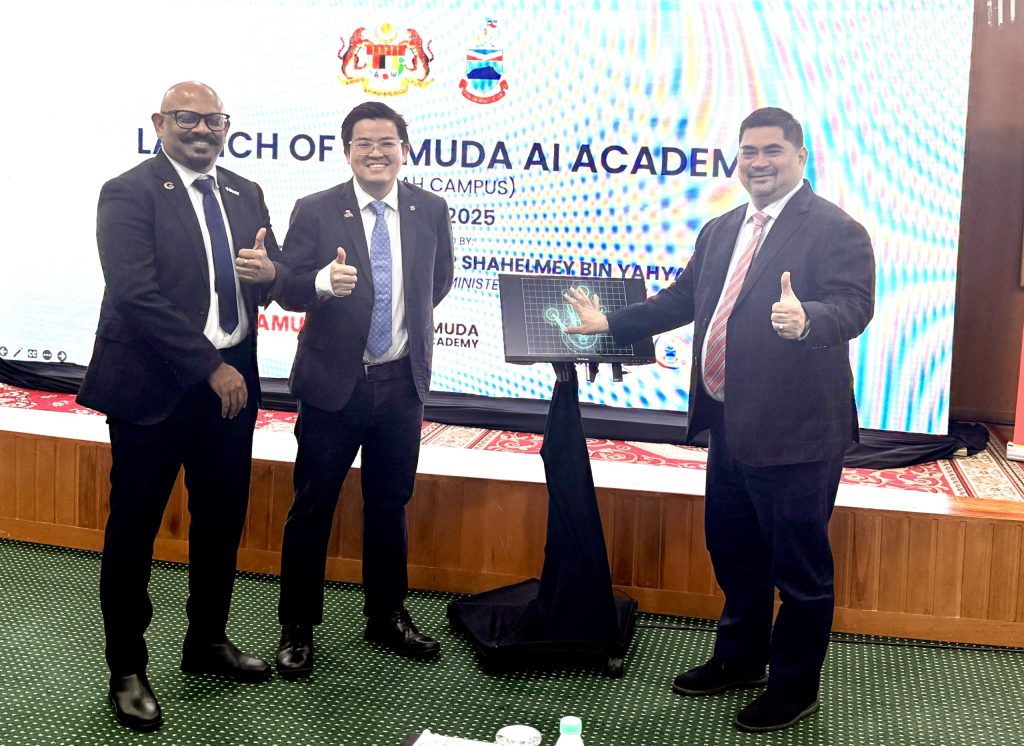Sabah welcomes first Gamuda AI Academy in East Malaysia

Kota Kinabalu (July 1): Sabah has made a significant leap into the digital age with the launch of its very own Gamuda AI Academy, the first of its kind in East Malaysia and only the second nationwide.
The Sabah branch of the academy is located at the Sabah State Library and has already welcomed its inaugural batch of 30 trainees. The first Gamuda AI Academy was launched in Kuala Lumpur in October last year.
The launch ceremony here was officiated by Deputy Chief Minister III cum Works Minister Datuk Shahelmey Yahya, and attended by Gamuda Berhad Group Chief Digital Officer John Lim Ji Xiong and Raja Azmi, Head of Strategic Initiatives for Public Sector, Southeast Asia at Google Cloud.
Speaking to reporters after the event on Tuesday, Shahelmey lauded the collaboration between Gamuda and Google, with support from the Sabah Ministry of Science, Technology and Innovation, as a timely initiative in addressing the growing demand for Artificial Intelligence (AI) skills.
“This academy provides young Sabahans with the opportunity to gain expertise in AI, a field that is increasingly in demand in today’s digital era.
“With this first batch of 30 participants undergoing three months of training, we hope to see tangible results in how we adopt and apply digital and AI technologies,” he said.
Shahelmey also expressed hope that the programme will continue to grow and nurture more home-grown talent through its structured training modules.
“We are aware of the critical role AI plays in the digital economy. This initiative aligns with the state’s priority to equip our youth with new skills through Technical and Vocational Education and Training (TVET) and STEM (Science, Technology, Engineering, and Mathematics).
“The state government has also allocated funding to boost interest in STEM and TVET among students,” he said, adding that such exposure is essential to developing future professionals, entrepreneurs and innovators from Sabah.
He emphasised that the Gamuda AI Academy’s curriculum is timely and crucial to preparing Sabah’s youth for the demands of the evolving job market.
“The hope is that graduates from this academy will be at the forefront of AI transformation across Sabah, be it in the public sector, the startup community or enterprises of all sizes.
“Since its inception in KL, the academy has already produced three successful cohorts and over 100 AI-trained graduates. I look forward to seeing this success replicated here, especially in closing the digital literacy gap among our youth,” he added.
John, when met, shared that trainees would undergo intensive training using platforms such as Google Cloud and tools like Gemini.
“The courses include learning how to code with Gemini, integrating it into apps, and building real-world applications. By the end of the programme, even those with zero coding background will have the skills to enter the tech workforce,” he said.
In his address, John noted that Gamuda has already begun integrating AI into its own operations using its in-house platform BotUnify.
“We empower our staff to make better data-driven decisions on the ground. With GLConnect, our customers can now use GenAI to customise their home interior designs easily.
“Gamuda’s mission is to nurture a new generation of AI leaders and innovators. By combining GenAI with Cloud, we’re revolutionising the construction and engineering sectors.
“That’s why we’re committed to offering high-quality syllabus, cutting-edge technology, and world-class mentorship to the people of Sabah,” he added.
The Sabah campus will operate at the Sabah State Library for the first six months before moving to a permanent location. The full-time training runs Monday to Friday, 9am to 5pm, and is open to Sabahans aged 21 to 40 from all backgrounds. Classes began on 1 July and will run for three months.
Also present during the event were Google Cloud’s Head of Strategic Pursuits, Public Sector, Southeast Asia, Raja Azmi as well alumni of Gamuda AI Academy from the KL campus, who shared their journeys and success stories. They were Muhammad Syazwan Mohamed (Trainer, Cohort 2), Nurin Nadhirah Irman (Technical Sales Executive, Cohort 2) and Issac Ebi (Trainer, Cohort 1).

